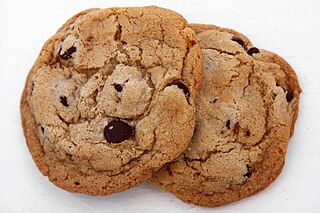
A cookie or biscuit is a baked snack or dessert that is typically small, flat, and sweet. It usually contains flour, sugar, egg, and some type of oil, fat, or butter. It may include other ingredients such as raisins, oats, chocolate chips, or nuts.
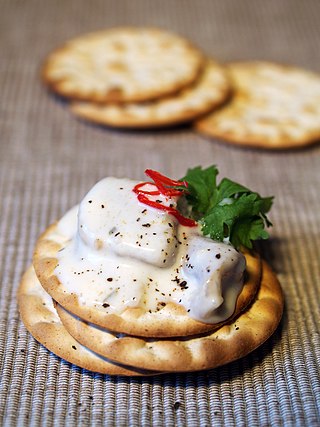
A cracker is a flat, dry baked biscuit typically made with flour. Flavorings or seasonings, such as salt, herbs, seeds, or cheese, may be added to the dough or sprinkled on top before baking. Crackers are often branded as a nutritious and convenient way to consume a staple food or cereal grain.
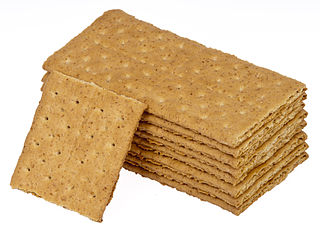
A graham cracker is a sweet flavored cracker made with graham flour that originated in the United States in the mid-19th century, with commercial development from about 1880. It is eaten as a snack food, usually honey- or cinnamon-flavored, and is used as an ingredient in some foods, e.g., in the graham cracker crust for cheesecakes and pies.

Cornbread is a quick bread made with cornmeal, associated with the cuisine of the Southern United States, with origins in Native American cuisine. It is an example of batter bread. Dumplings and pancakes made with finely ground cornmeal are staple foods of the Hopi people in Arizona. The Hidatsa people of the Upper Midwest call baked cornbread naktsi, while the Choctaw people of the Southeast call it bvnaha. The Cherokee and Seneca tribes enrich the basic batter, adding chestnuts, sunflower seeds, apples, or berries, and sometimes combine it with beans or potatoes. Modern versions of cornbread are usually leavened by baking powder.

A biscuit, in many English-speaking countries, including Britain, Ireland, Australia, New Zealand, India, and South Africa but not Canada or the US, is a flour-based baked and shaped food item. Biscuits are typically hard, flat, and unleavened. They are usually sweet and may be made with sugar, chocolate, icing, jam, ginger, or cinnamon. They can also be savoury, similar to crackers. Types of biscuit include biscotti, sandwich biscuits, digestive biscuits, ginger biscuits, shortbread biscuits, chocolate chip cookies, chocolate-coated marshmallow treats, Anzac biscuits, and speculaas.
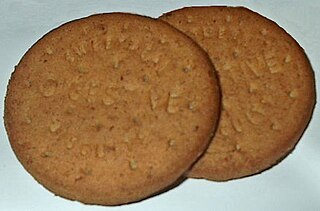
A digestive biscuit, sometimes described as a sweet-meal biscuit, is a semi-sweet biscuit that originated in Scotland. The digestive was first developed in 1839 by two doctors to aid digestion. The term digestive is derived from the belief that they had antacid properties around the time the biscuit was first introduced due to the use of sodium bicarbonate as an ingredient. Historically, some producers used diastatic malt extract to "digest" some of the starch that existed in flour prior to baking.

Hardtack is a type of dense cracker made from flour, water, and sometimes salt. Hardtack is inexpensive and long-lasting. It is used for sustenance in the absence of perishable foods, commonly during long sea voyages, land migrations, and military campaigns. Along with salt pork and corned beef, hardtack was a standard ration for many militaries and navies from the 17th to the early 20th centuries.
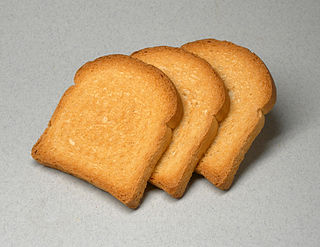
A rusk is a hard, dry biscuit or a twice-baked bread. It is sometimes used as a teether for babies. In some cultures, rusk is made of cake, rather than bread: this is sometimes referred to as cake rusk. In the UK, the name also refers to a wheat-based food additive.

Carr's is a British biscuit and cracker manufacturer, currently owned by Pladis Global through its subsidiary United Biscuits. The company was founded in 1831 by Jonathan Dodgson Carr and is marketed in the United States by Kellogg's.

Cobbler is a dessert consisting of a fruit filling poured into a large baking dish and covered with a batter, biscuit, or dumpling before being baked. Some cobbler recipes, especially in the American South, resemble a thick-crusted, deep-dish pie with both a top and bottom crust. Cobbler is part of the cuisine of the United Kingdom and United States, and should not be confused with a crumble.

Unleavened bread is any of a wide variety of breads which are prepared without using rising agents such as yeast or sodium bicarbonate. The preparation of bread-like non-leavened cooked grain foods appeared in prehistoric times.

A saltine or soda cracker is a thin, usually square, cracker, made from white flour, sometimes yeast, and baking soda, with most varieties lightly sprinkled with coarse salt. It has perforations over its surface, as well as a distinctively dry and crisp texture.

Springerle is a type of South German biscuit or cookie with an embossed design made by pressing a mold onto rolled dough and allowing the impression to dry before baking. This preserves the detail of the surface pattern. While historical molds show that springerle were baked for religious holidays and secular occasions throughout the year, they are now most commonly associated with the Christmas season.

Arnott's Group is an Australian producer of biscuits and snack food. Founded in 1865 by William Arnott, they are the largest producer of biscuits in Australia and a subsidiary of KKR.
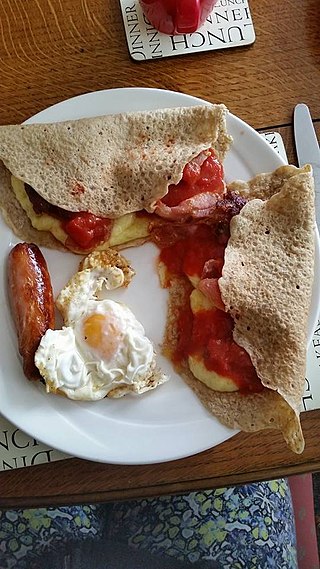
A Staffordshire oatcake is a type of dense, savoury pancake made from oatmeal, flour and yeast. It is cooked on a griddle, "backstone" or "baxton". The oatcake is a local speciality in the North Staffordshire area of England. They are normally referred to as Staffordshire oatcakes by non-locals, because they are made in and around Staffordshire and Cheshire; locally they are simply called "oatcakes".
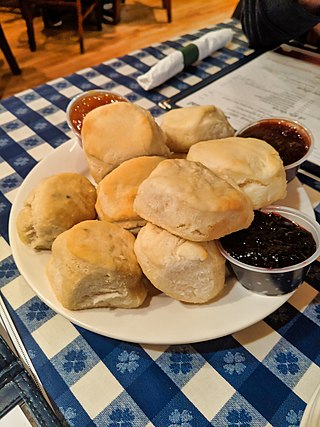
In the United States, a biscuit is a variety of baked bread with a firm, dry exterior and a soft, crumbly interior. In Canada it sometimes also refers to this or a traditional European biscuit. It is made with baking powder as a leavening agent rather than yeast, and at times is called a baking powder biscuit to differentiate it from other types. Like other forms of bread, a biscuit is often served with butter or other condiments, flavored with other ingredients, or combined with other types of food to make sandwiches or other dishes.















